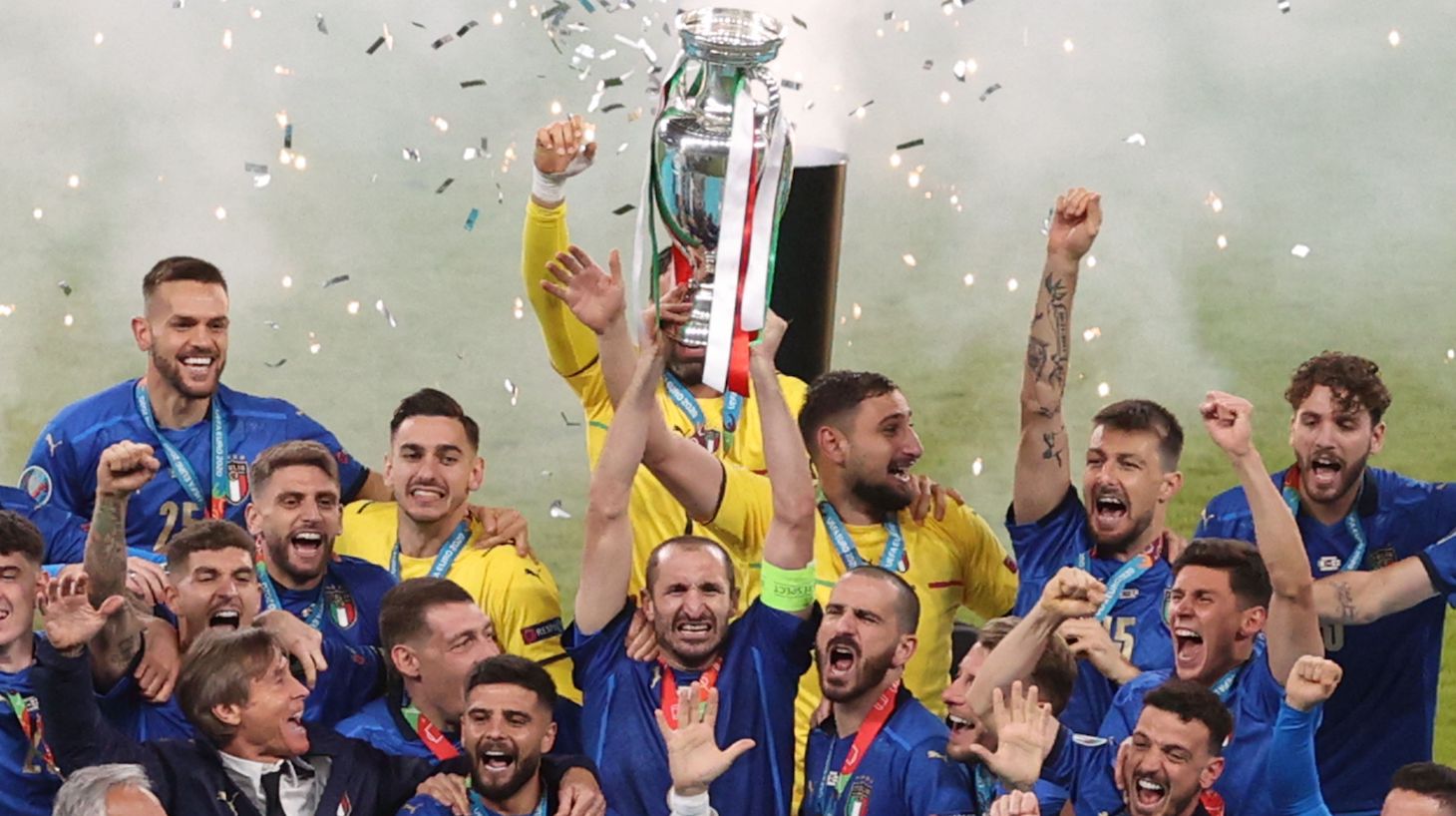About the most you can ask of a champion is that their victory feels just. It's true that a key part of soccer's appeal is that the game is so difficult and flukey and low-scoring that it creates the conditions for David to topple Goliath, but it's also true that the most satisfying results tend to be those where the victor, be it David or Goliath, overcomes the sport's inherent disorderliness to impose an order from which victory is achieved, so that you come away thinking the right team won. By being clearly the best team throughout the duration of the Euros, by offering a coherent narrative arc that traced from the nadir of failing to qualify for the 2018 World Cup through Serie A's tactical renaissance and finally to Sunday's redemptive climax, and by committing to an adventurous and entertaining way of playing that got the best out of its best players, Italy did just that, making a convincing case that it deserved to win, and then going ahead and winning.
The final itself, though ultimately decided by the crapshoot of a penalty shootout, was another instance of Italy getting its just desserts—though England started the match with maybe its strongest 30 minutes of the whole tournament. The opening goal—scored two minutes in by wing back Luke Shaw and assisted by wing back Kiernan Trippier, which seemed to (temporarily) vindicate manager Gareth Southgate's controversial decision to start Trippier over several of the team's more talented and more attacking players—settled England's nerves and inspired them to press on for glory. The English didn't muster another shot in the first half, but they still regularly ripped open the Italian defense by finding one of the front three between Italy's lines and combining down the flanks into open space.
The tide began to turn about 30 minutes in. After failing to get a second goal, England's attentions turned more toward protecting its first one, and so the team sunk deeper into its own half. For their part, the Italians started putting together more passes, had less trouble evading England's less intense pressure, and grew into the game. There was one stretch in particular where Italy had its first good and long possession, marching the ball up the length of the pitch, probing for a way into England's penalty box, not finding it and so recirculating the ball around to the other wing, losing possession but winning it back immediately. The play didn't amount to anything in the end, but it signified that Italy had taken England's best punch, and after a dazed spell had regained control of the bout. That sense of Italy dictating the terms of the game lasted for the entire rest of the match.
In terms of its deservingness, how Italy took control of the game was as important as the fact of that control itself. Rather than abandoning the intricate, free-flowing style that got them there, the Azzurri doubled down on it. Rather than pushing numbers forward in search of the equalizing goal, Italy dropped its midfield maestro Marco Verratti deeper, so that he could lure England's midfielders forward, which opened up space in front of the English back line for the likes of Lorenzo Insigne and Federico Chiesa to take advantage. Rather than looking for a shortcut to a goal by raining balls over the top onto Ciro Immobile's runs in behind, manager Roberto Mancini took Immobile off the field and moved fun-sized forward Insigne more centrally, so that his deeper positioning could help the midfield knit together attacking moves. Even after fatigue and injury saw Verratti, Insigne, and Chiesa subbed out and replaced with lesser players, Italy's deeply embedded style carried them through in the same fashion. Again, the match did go to penalties, but outside that opening 30 minutes, Italy was the only team that had the look of a winner. Penalty shootouts are random and cruel but necessary, and thankfully in this instance they broke the right way.
(Side note on the penalties: The grief Gareth Southgate is taking for the penalty order stuff feels way overblown. Subbing on Sancho and Rashford as penalty specialists, giving the last kick to Saka—even if you think they were ill-advised decisions, they are minor sins in the grand scheme. Saka's penalty wasn't even all that bad, so it's unclear why that was supposedly some enormous strategic blunder, even if it was a clear failure of emotional management in heaping the weight of that moment onto a teenager in light of what his potential failure would mean. England had 120 minutes to win the game and couldn't, and it's a much more damnable fact that Sancho, Grealish, and Saka started the game on the bench in favor of a defender than anything about whether a different penalty order would've helped the coin flip England's way.)
For Italy, the realization of this success has to be incredibly sweet. Just four years ago the country was at rock bottom after failing to make it to the World Cup in Russia, and now it is here, putting on just about as comprehensive a performance over the course of the tournament as you could imagine. When making a team of the tournament, you'd have to at least consider eight different Italians for spots in the starting XI. (Namely: Donnarumma, Spinazzola, Chiellini, Bonucci, Verratti, Jorginho, Insigne, and Chiesa.) The manager of the tournament was definitely Mancini, who adopted some of the tips and tricks found in Italy's tactically rich domestic league (Gasperini, Conte, De Zerbi, Sarri, and Spalletti are some of the most forward-thinking managers in the game today) to create a new Italian style that will surely be studied everywhere. This was a resounding victory for not only the members of the national team, but for all of Italian soccer. And because this win can and does mean all of that for Italy and for the sport as a whole, when an English victory wouldn't have stood for much, that is precisely why Italy really deserved that trophy, in all senses of the word.





